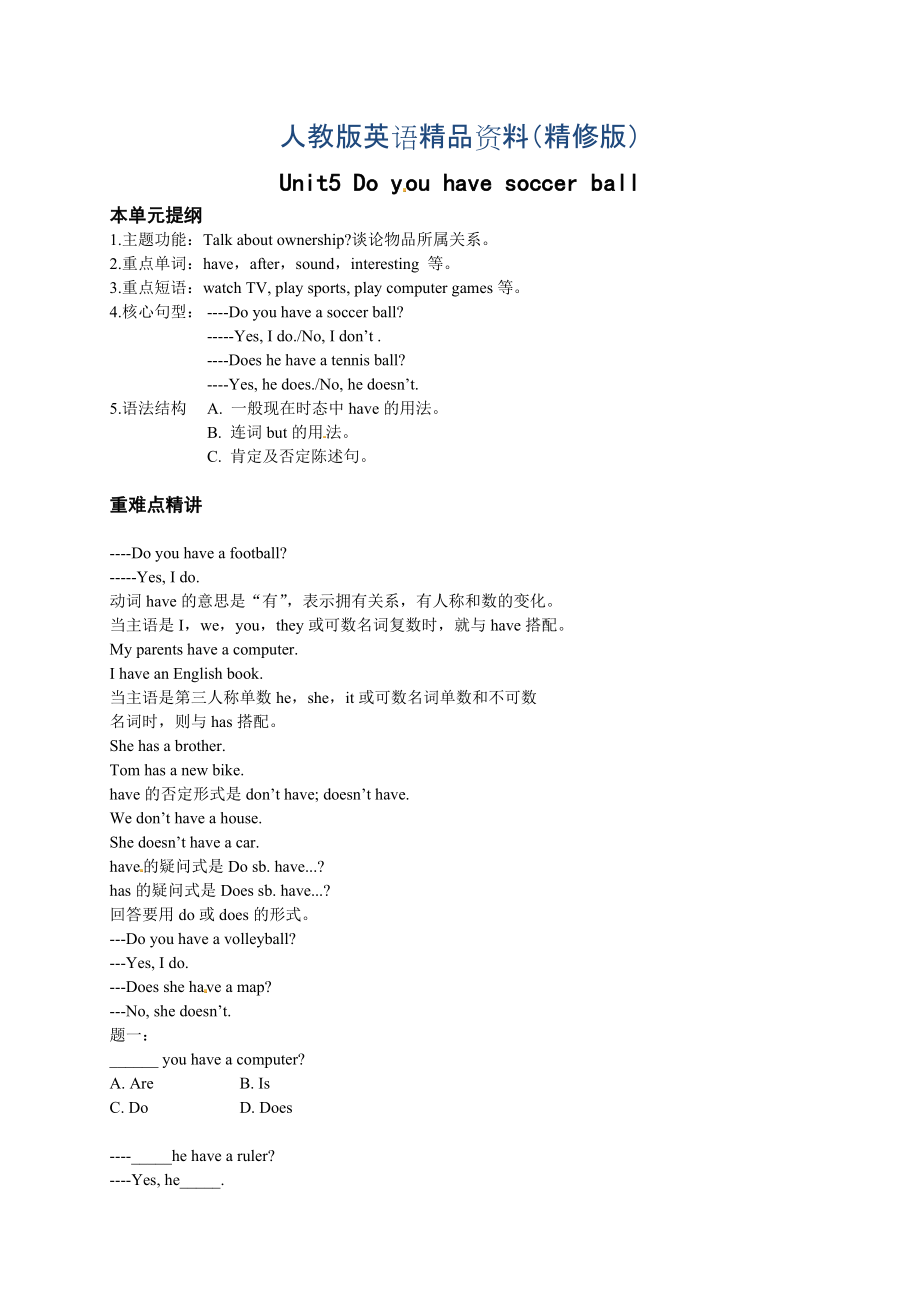《人教版七年級上期 Unit5 Do you have a soccer ball 名師講義含答案精修版》由會員分享����,可在線閱讀,更多相關(guān)《人教版七年級上期 Unit5 Do you have a soccer ball 名師講義含答案精修版(4頁珍藏版)》請在裝配圖網(wǎng)上搜索�����。
1�����、人教版英語精品資料(精修版)
Unit5 Do you have soccer ball
本單元提綱
1.主題功能:Talk about ownership?談?wù)撐锲匪鶎訇P(guān)系。
2.重點單詞:have�,after,sound���,interesting 等���。
3.重點短語:watch TV, play sports, play computer games等。
4.核心句型: ----Do you have a soccer ball?
-----Yes, I do./No, I don’t .
----Does he have a
2�����、tennis ball?
----Yes, he does./No, he doesn’t.
5.語法結(jié)構(gòu) A. 一般現(xiàn)在時態(tài)中have的用法���。
B. 連詞but的用法���。
C. 肯定及否定陳述句。
重難點精講
----Do you have a football?
-----Yes, I do.
動詞have的意思是“有”����,表示擁有關(guān)系,有人稱和數(shù)的變化�。
當主語是I���,we,you����,they或可數(shù)名詞復(fù)數(shù)時���,就與have搭配����。
My parents have a computer.
I h
3����、ave an English book.
當主語是第三人稱單數(shù)he,she�,it或可數(shù)名詞單數(shù)和不可數(shù)
名詞時,則與has搭配�����。
She has a brother.
Tom has a new bike.
have的否定形式是don’t have; doesn’t have.
We don’t have a house.
She doesn’t have a car.[來源:]
have的疑問式是Do sb. have...?
has的疑問式是Does sb. have...?
回答要用do或does的形式�����。
---Do you have a volleyball?
4、---Yes, I do.
---Does she have a map?
---No, she doesn’t.
題一:
______ you have a computer?
A. Are B. Is
C. Do D. Does
----_____he have a ruler?
----Yes, he_____.
A. Does, do B. Do, do
C. Does, does D. Do, does
I _____ a ping-pang ball and she ____ a basketball.[來源:]
5�����、A. have, have B. has, have
C. have, has D. has, has
Let’s go.
讓我們走吧�����。
這是一個由let開頭的祈使句���。祈使句是命令�,要求
某人做某事的句子����,其結(jié)構(gòu)為let sb. do sth.
意思是“讓某人做某事”,表示說話人的建議����。
Let me go.
Let Jack look at the picture.
Let’s表示“讓我們...吧”,用于提出建議或征求別人意見�。
Let’s go shopping.
Let’s go to school.
題二:
Let’s go and
6、 ____ your mother.
A. helps B. help
C. to help D. helping
----Let’s ___to the park, Peter.
----Okay!
A. go B. to go
C. going D. goes
----Let’s play soccer.
----____. I want to watch TV.
A. That’s good B. Yes, it’s hard
C. No, I don’t really like it. D. I’m ok
7�����、ay.
I love sports, but I don’t play them—I only watch them.
but是一個并列連詞,表轉(zhuǎn)折意義�,意思是“但是,
然而”�����,常用來連接兩個并列的句子���。
題三:[來源:]
Bob has ten soccer balls, _____ he never play them.
A. and B. for
C. but D. to
The boy is five years old, ____ he can write novels.(寫小說)
A. and B. so
C. if
8、 D. but
play+球類名詞�����,意思是做什么運動����,球類名詞前
不能加冠詞。
play sports 進行體育活動
play soccer 踢足球
play basketball 打籃球
After class, I play ping-pang with my classmates.
After介詞����,表示“在......之后”,指時間上的先后
關(guān)系���。
behind是指空間上的前后關(guān)系�。
I often play games with my friends after class.
There is a big tree behind the house
9、.
with是介詞�����,后面接名詞或是代詞賓格���,意思是“和誰一起”�。
題四:
Can you go to school ____ me?
A. for B. with
C. after D. and
I will go shopping, do you want to go___ me?
A. for B. to
C. at D. with
能力提升與拓展
題五:
根據(jù)漢語意思完成下列句子���。
我沒有電視機���。
I ____ ____a TV set.
琳達通常在放學(xué)后常做運動。
Linda often __
10����、___ _____ _____ _____.
那個故事聽起來很有趣。[來源:]
The story ____ _____.[來源:]
咱們看電視吧���。
Let’s _____ _____.
你有一個妹妹嗎�����?不����,我沒有。
讓我們玩電腦游戲吧�����!聽起來好極了�����。
Unit5 Do you have soccer ball
講義參考答案
重難點精講
題一:CCC
題二:BAC
題三:CD
題四:BD
能力提升與拓展
題五:don’t have; plays sports after school; sounds interesting; watch TV;
Do you have a sister? No, I don’t.
Let’s play computer games! It sounds great.
 人教版七年級上期 Unit5 Do you have a soccer ball 名師講義含答案精修版
人教版七年級上期 Unit5 Do you have a soccer ball 名師講義含答案精修版

